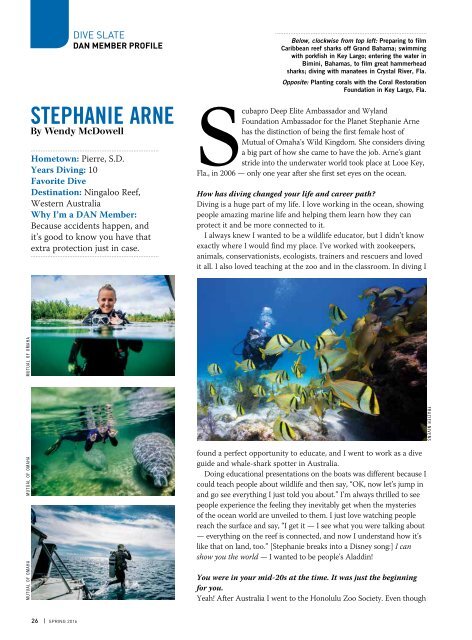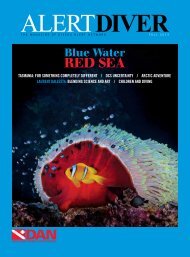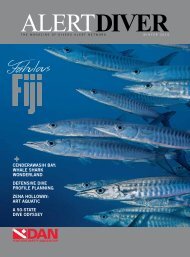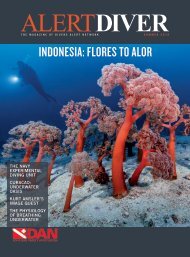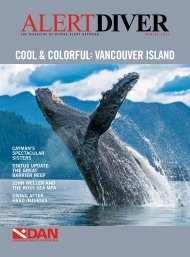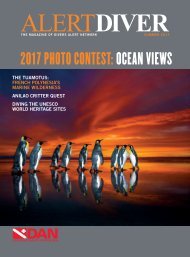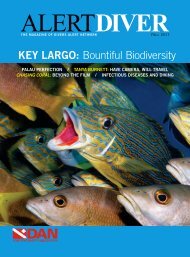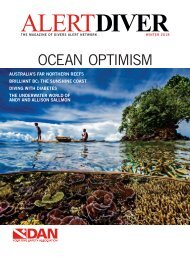AD 2016 Q2
As we pointed out in the spring 2013 edition of the Alert Diver, even being a dive buddy has potential legal implications. So, to bump this up a notch, what about the diver training organisations themselves? Where do they stand? How do they relate to South African law? Are they all considered the same under our legal system in spite of the differences in organisational structures and training programmes? How does this affect their respective instructors and trainee divers from a legal perspective? These are not exactly simple questions. It is certainly true that the respective training organisations differ in a number of ways. However, this does not imply that there are necessarily differential legal implications for each of them. In fact, under South African law, the legal principles are common in all matters. Therefore, if you suffer a loss and you (or your estate in the case of a fatality) wish to recover damages, the legal principles would be applied commonly; whether you are driving or diving. Although not a frequent occurrence, there have been quite a number of law suits associated with diving injuries and damages in South Africa. This is not surprising, as the occurrence of law suits is really a function of “numbers”. As training increases, so do the chances of injuries and, with it, the chances of legal recourse. So, it remains wise to insure yourself, your equipment or your business in a proper and effective way. But before getting back to the potential differences amongst the training agencies, let’s first explore the foundational legal principles on which any civil claim would be adjudicated: inherent risk, negligence and duty to take care.
As we pointed out in the spring 2013 edition of the Alert Diver, even being a dive buddy has potential legal implications. So, to bump this up a notch, what about the diver training organisations themselves? Where do they stand? How do they relate to South African law? Are they all considered the same under our legal system in spite of the differences in organisational structures and training programmes? How does this affect their respective instructors and trainee divers from a legal perspective? These are not exactly simple questions.
It is certainly true that the respective training organisations differ in a number of ways. However, this does not imply that there are necessarily differential legal implications for each of them. In fact, under South African law, the legal principles are common in all matters. Therefore, if you suffer a loss and you (or your estate in the case of a fatality) wish to recover damages, the legal principles would be applied commonly; whether you are driving or diving.
Although not a frequent occurrence, there have been quite a number of law suits associated with diving injuries and damages in South Africa. This is not surprising, as the occurrence of law suits is really a function of “numbers”. As training increases, so do the chances of injuries and, with it, the chances of legal recourse.
So, it remains wise to insure yourself, your equipment or your business in a proper and effective way. But before getting back to the potential differences amongst the training agencies, let’s first explore the foundational legal principles on which any civil claim would be adjudicated: inherent risk, negligence and duty to take care.
You also want an ePaper? Increase the reach of your titles
YUMPU automatically turns print PDFs into web optimized ePapers that Google loves.
DIVE SLATE<br />
DAN MEMBER PROFILE<br />
STEPHANIE ARNE<br />
By Wendy McDowell<br />
Hometown: Pierre, S.D.<br />
Years Diving: 10<br />
Favorite Dive<br />
Destination: Ningaloo Reef,<br />
Western Australia<br />
Why I’m a DAN Member:<br />
Because accidents happen, and<br />
it’s good to know you have that<br />
extra protection just in case.<br />
Below, clockwise from top left: Preparing to film<br />
Caribbean reef sharks off Grand Bahama; swimming<br />
with porkfish in Key Largo; entering the water in<br />
Bimini, Bahamas, to film great hammerhead<br />
sharks; diving with manatees in Crystal River, Fla.<br />
Opposite: Planting corals with the Coral Restoration<br />
Foundation in Key Largo, Fla.<br />
Scubapro Deep Elite Ambassador and Wyland<br />
Foundation Ambassador for the Planet Stephanie Arne<br />
has the distinction of being the first female host of<br />
Mutual of Omaha’s Wild Kingdom. She considers diving<br />
a big part of how she came to have the job. Arne’s giant<br />
stride into the underwater world took place at Looe Key,<br />
Fla., in 2006 — only one year after she first set eyes on the ocean.<br />
How has diving changed your life and career path?<br />
Diving is a huge part of my life. I love working in the ocean, showing<br />
people amazing marine life and helping them learn how they can<br />
protect it and be more connected to it.<br />
I always knew I wanted to be a wildlife educator, but I didn’t know<br />
exactly where I would find my place. I’ve worked with zookeepers,<br />
animals, conservationists, ecologists, trainers and rescuers and loved<br />
it all. I also loved teaching at the zoo and in the classroom. In diving I<br />
MUTUAL OF OMAHA<br />
FRAZIER NIVENS<br />
MUTUAL OF OMAHA<br />
MUTUAL OF OMAHA<br />
found a perfect opportunity to educate, and I went to work as a dive<br />
guide and whale-shark spotter in Australia.<br />
Doing educational presentations on the boats was different because I<br />
could teach people about wildlife and then say, “OK, now let’s jump in<br />
and go see everything I just told you about.” I’m always thrilled to see<br />
people experience the feeling they inevitably get when the mysteries<br />
of the ocean world are unveiled to them. I just love watching people<br />
reach the surface and say, “I get it — I see what you were talking about<br />
— everything on the reef is connected, and now I understand how it’s<br />
like that on land, too.” [Stephanie breaks into a Disney song:] I can<br />
show you the world — I wanted to be people’s Aladdin!<br />
You were in your mid-20s at the time. It was just the beginning<br />
for you.<br />
Yeah! After Australia I went to the Honolulu Zoo Society. Even though<br />
26 | SPRING <strong>2016</strong>


